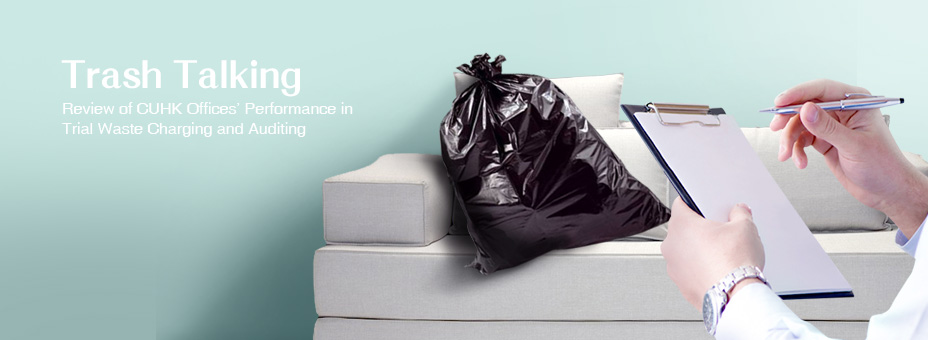
Sometimes success entails getting one’s hands dirty—and in CUHK’s case, ‘very dirty’ might be an understatement for the momentous task of opening and analyzing the contents of 20,000 trash bags, samples drawn from various CUHK units over an eight-and-a-half-month period, as preparation for the government’s upcoming quantity-based charging scheme for municipal solid waste (MSW) disposal.
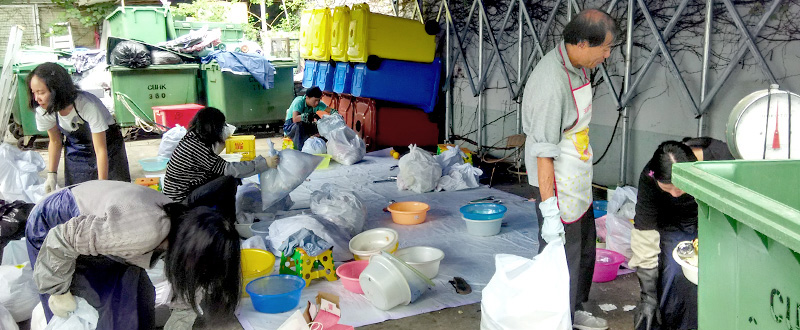
This quest to leave no sample trash bag unturned is the first and most large-scale Environment and Conservation Fund (ECF)-funded trial operation on internal waste charging and auditing in Hong Kong academia, and is unprecedented in its diversity of types of participating units—six teaching and research units, six administrative units, five Colleges and 140 staff quarters—that together account for around half of the campus’s total waste generated.
This is also the first audit performed by the University that used stickers with QR codes and radio frequency identification (RFID) chips (both designed by Secure Information Disposal Services Ltd, CUHK’s waste management partner in this project) to trace each bag of waste back to the office/unit from which it originated, allowing the University to determine the volume of waste generated by each participating unit, and via periodic sampling of the waste from each unit, learn about the participants’ waste composition, as well as the generation and recycling patterns.
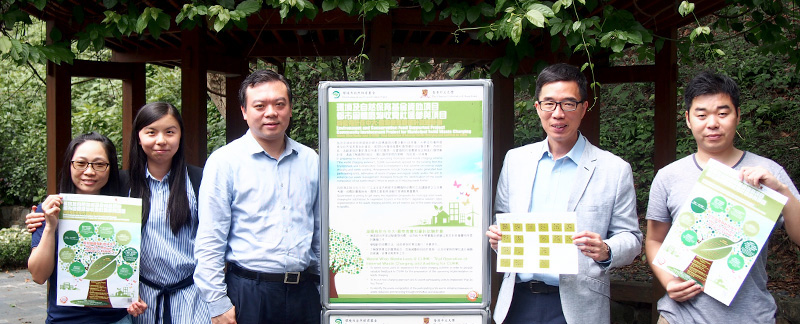
The trial, titled ‘Waste Wise Waste Less @ CUHK—Trial Operation of Internal Waste Charging and Auditing for CUHK’, has been concluded after a year-long project period and its waste audit results have been shared with participating units. On the whole, how well has the scheme worked out? Mr. Jor Fan, Environmental Sustainability Manager of the Estates Management Office (EMO), shared: ‘While most participating units reported that affixing the QR code stickers to trash bags, which allowed the origin of each trash bag to be traced, was not a chore, ensuring that the labelled bags were properly tracked was challenging at first because the sticker and trash bag colours were white on white, making the stickers easy to miss especially when the labelled bags were mixed with unlabelled ones in wheelie bins. Later, we changed the sticker colour to a more conspicuous yellow, as well as providing designated wheelie bins for the exclusive use of units participating in the trial. These have improved the effectiveness of tracking.
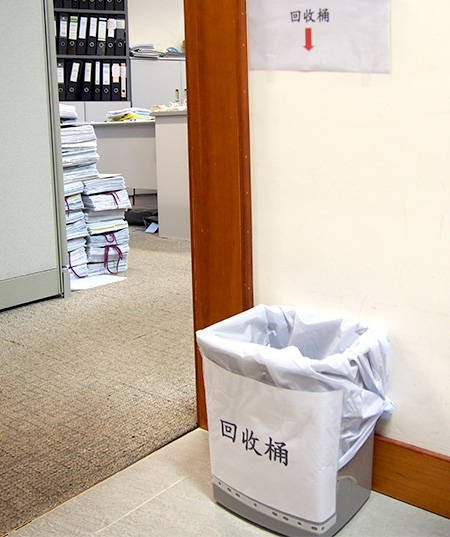
‘It was also our aim to promote recycling via this exercise. Besides producing exhibition boards, bin stickers and posters to raise user awareness, we also engaged frontline staff in participating offices to give users’ trash a look-over and pick out recyclables before bagging the trash. What we did not expect was that some of the frontline staff actually did a great job in prompting users to recycle. Sometimes, direct communication among colleagues is the best way to bring the message home.’
Through the exercise, CUHK units could learn about the composition of their waste and come up with waste reduction measures accordingly. A few participating units have added containers to collect recyclables in pantries, with positive results. The Faculty of Medicine units in Lo Kwee-Seong Integrated Biomedical Sciences Building, for example, requested EMO’s help to install a glass recycling bin after noting its waste audit results. ‘As recyclable glass was found in our waste samples in an initial audit, we thought a recycling bin would help. In the subsequent audit, almost no recyclable glass was found in trash samples,’ shared Mr. Eugene Wong, Laboratory Technologist of the School of Biomedical Sciences.
Waste audits can also help evaluate the effectiveness of existing green measures. Daisy Li Hall (DLH), a student hostel of New Asia College, drew EMO’s attention with its ‘abnormally low’ amount of food waste—less than a third of that found in other participating hostels—in its trash samples. A likely reason was that seeking to tackle the problem of fridges overstuffed with spoiled food, a perpetual bane of hostels, DLH launched a bold experiment in September 2016: ‘We encourage our residents to share their soon-to-expire foods with floor mates and would confiscate all unlabelled and opened foodstuffs in the fridge on a monthly basis. Foodstuffs labelled with room numbers were returned to their owners,’ said Ms. Winnie Kwok, Honorary Lady Warden of DLH. ‘From the results of the waste audit, it seems that this experimental practice may have been helpful in reminding students to keep track of their food stock and not purchase excessive supplies.’
The hostel’s tutors, the heart and soul of the hostel’s ‘DLH Go Green’ programme, have launched various initiatives that encourage hostel residents to freecycle unwanted items. These include an Eco-sale of second-hand hostel accessories at the start of semester and establishment of a popular freecycling station for residents to exchange second-hand items.
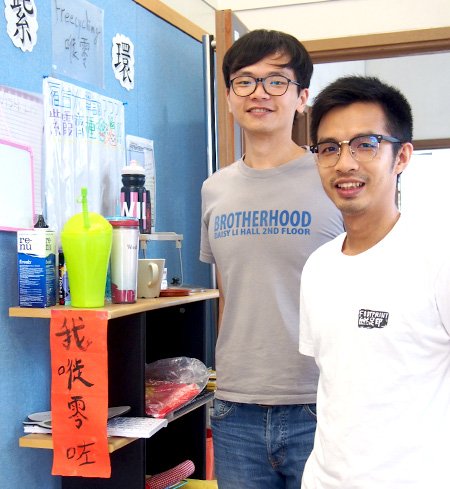
The audits also highlighted possible problems associated with the impending implementation of MSW charging scheme. Some CUHK departments that manage public areas like conference rooms and 24-hour study areas, for example, discovered that a large proportion of trash collected from their premises were in fact not generated by their own members. There were also concerns that publicly accessible refuse collection points could become convenient dumping sites for members of the public who seek to dodge the waste disposal charges. Based on feedback from participating units, the University will compile a best practice guide for the government’s reference in developing solutions and fine-tuning its policy.
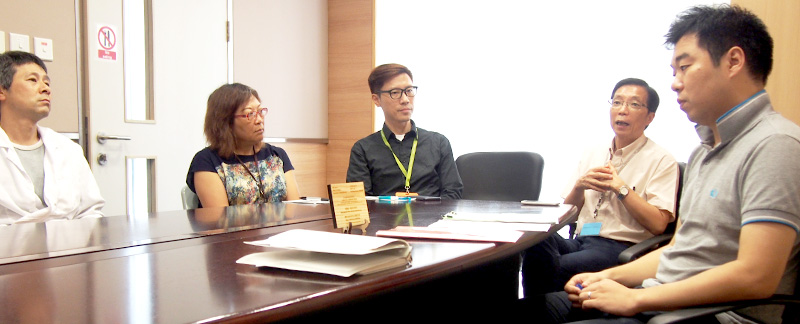
Mr. Edmond Lam, Director of Estates Management, said ‘Waste Wise Waste Less @ CUHK’ can help CUHK determine its optimal waste charging strategy and formulate better engagement programmes. ‘Through this exercise, we have learnt much about the waste generation patterns of different users. For example, administrative offices tend to have a greater proportion of paper in their waste, while food waste is a major component in hostel waste. Once mandatory charging for MSW disposal commences, CUHK will most likely pay a ‘gate fee’ (tipping fee) to the government based on the total weight of MSW generated on campus, and in conjunction, require our units to use dedicated trash bags designed by the University that will allow us to trace each bag of trash to its origin.
‘This will enable the enforcement of the “polluter pays principle”—the fewer trash bags offices use, the less they will have to pay, and most importantly, we can continue to audit the waste and come up with more effective waste reduction and recycling programmes tailored to different units’ needs.’


